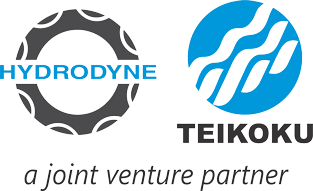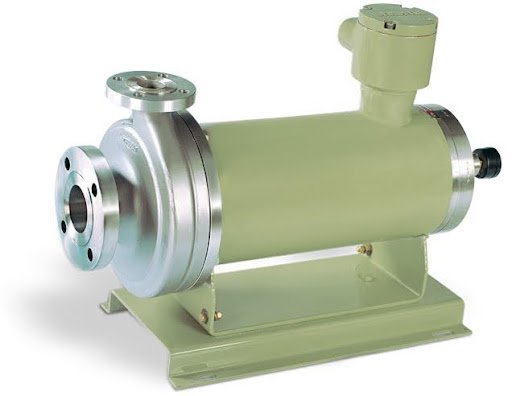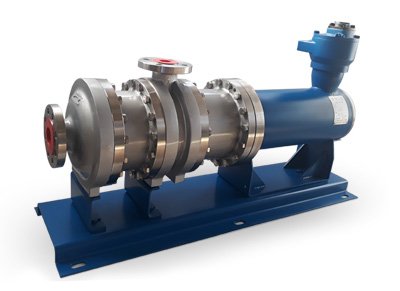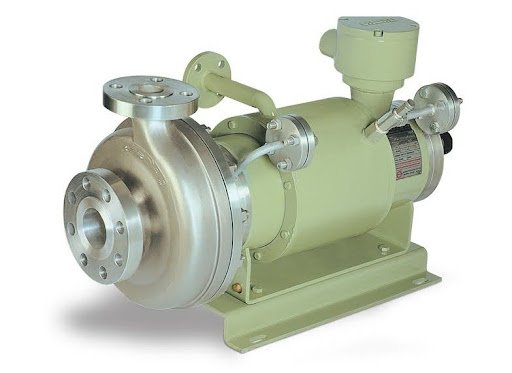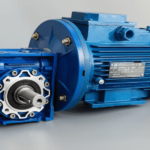
Hydrodyne Teikoku On Industrial Emission Control: Key Trends, Challenges & Solutions
September 25, 2025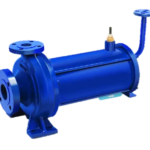
Best Liquid Refrigerant Pumps & Parts for Industrial Applications
September 25, 2025In industries such as petrochemicals, pharmaceuticals, nuclear power, and oil & gas, the performance and reliability of pumps are absolutely critical. Even a minor leak or mechanical failure can halt production, pose safety risks, damage the environment, and lead to significant financial losses. This is where canned motor pumps from Hydrodyne Teikoku make a significant difference.
Our canned motor pumps are hermetically sealed and maintenance-friendly. By integrating the motor and pump into a single unit, we eliminate mechanical seals and provide a leak-free, reliable solution for handling fluids under diverse and demanding industrial conditions. These pumps are designed to handle extreme temperatures, pressures, abrasive fluids, and sensitive chemicals with precision.
In this article, we take a detailed look at our products, their specific uses, the applications where they excel, and the industries that benefit most from them.
1. Basic Internal Circulation Pump
Use: The basic internal circulation pump is designed to provide continuous fluid circulation in standard industrial processes. Its simple yet robust design ensures smooth operation while maintaining a leak-free environment.
Applications:
- Chemical circulation: Ideal for moderate-pressure chemical processes where reliable fluid movement is crucial.
- Cooling water loops: Used in machinery and industrial plants to maintain optimal operating temperatures.
- General industrial processes: Suitable for any operation requiring consistent, leak-free fluid movement.
These pumps are often the unsung heroes in industrial setups. They maintain process consistency, reduce downtime, and support equipment longevity. Their simple design also means easier installation and fewer operational issues compared to complex systems.
2. Reverse Circulation Pump
Use: Reverse circulation pumps are specifically engineered to handle backflow or fluid recirculation requirements. They ensure a uniform flow, preventing hotspots or uneven heating in sensitive systems.
Applications:
- Heat exchangers: Maintain consistent temperature distribution to protect products and processes.
- Reactors: Provide uniform fluid circulation in chemical and pharmaceutical production.
- Processes sensitive to fluid stagnation: Prevents operational inconsistencies due to stagnant zones.
In industries where temperature control is critical, reverse circulation pumps ensure that reactions proceed uniformly, reducing waste and improving product quality. They are particularly important in pharmaceutical and chemical plants where slight temperature variations can affect output.
3. High-Temperature Pump
Use: High-temperature pumps are built to handle fluids at elevated temperatures while maintaining performance and safety.
Applications:
- Steam condensate transfer systems: Ensure safe and efficient transfer of condensate in high-temperature conditions.
- Hot oil circulation: Maintain fluid flow in chemical and petrochemical processes involving high-temperature oils.
- High-temperature chemical reactions: Critical for processes requiring precise thermal stability.
These pumps are constructed using materials that resist thermal degradation and maintain structural integrity under stress. High-temperature pumps from Hydrodyne Teikoku allow plants to operate safely without the risk of leaks, which is particularly important in petrochemical refining and chemical reactions.
4. Self-Priming Pump
Use: Self-priming pumps can start automatically without external priming, making them ideal for applications where suction lift is required.
Applications:
- Fluid transfer from storage tanks or sumps: Simplifies liquid transfer operations.
- Drainage operations: Reduces manual intervention in industrial facilities.
- Situations where manual priming is unsafe or impractical: Enhances operational efficiency and safety.
Self-priming pumps are particularly valuable in plants with multiple storage points or remote transfer locations. They reduce downtime and the risk of operator error, making them a cost-effective and safe solution for fluid handling.
5. Higher Heat-Resistant Pump
Use: Designed for extreme-temperature environments, these pumps ensure durability, reliable performance, and uninterrupted fluid flow.
Applications:
- Petrochemical refining processes: Handles high-temperature hydrocarbons safely.
- Oil-refining operations: Maintains fluid transport even when temperatures exceed standard limits.
- Industrial chemical processes with stringent thermal requirements: Ensures process continuity under demanding conditions.
Higher heat-resistant pumps are engineered with advanced materials and thermal-resistant components. They reduce the risk of mechanical failures and ensure that high-temperature processes continue without interruption, which is vital in oil and chemical industries.
6. Multistage Pump
Use: Multistage pumps use multiple impellers to generate higher pressures, making them suitable for demanding industrial tasks.
Applications:
- Boiler feed systems: Provides high-pressure water flow for power generation and process heating.
- Long-distance fluid transfer pipelines: Maintains pressure over extended pipelines for chemical and water distribution.
- High-pressure circulation systems: Ensures efficient circulation in high-pressure chemical or industrial applications.
These pumps are essential in processes where single-stage pumps cannot meet the pressure requirements. Multiple impellers allow smooth, efficient pressurisation, reducing energy consumption and extending pump life.
7. High-Melting Pump
Use: High-melting pumps maintain fluid flow for materials that solidify near ambient temperatures, preventing blockages and maintaining continuous operations.
Applications:
- Transport of molten fats, waxes, and resins: Common in food processing and specialty chemical production.
- Continuous flow of heat-sensitive products: Maintains product quality in temperature-critical processes.
- Handling specialty chemicals: Prevents clogs and ensures uninterrupted industrial operations.
High-melting pumps are designed to withstand the unique challenges posed by materials that solidify quickly. By maintaining consistent flow and temperature, they ensure minimal waste, reduced downtime, and operational efficiency.
8. Gas Seal Slurry Pump
Use: Gas seal slurry pumps are engineered for handling abrasive or gas-laden liquids safely and efficiently.
Applications:
- Mining slurry operations: Transfers abrasive and heavy slurries with minimal wear.
- Chemical and petrochemical slurries: Handles fluids containing entrained gases safely.
- Industrial processes unsuitable for conventional pumps: Provides reliability where standard pumps fail due to abrasiveness or aeration.
These pumps are crucial in industries where fluids contain solids or gases. The robust construction ensures longevity and process reliability, reducing maintenance and operational disruptions.
Why Hydrodyne Teikoku Canned Motor Pumps Are Indispensable
Hydrodyne Teikoku canned motor pumps are designed to meet the rigorous demands of modern industry:
- Leak-Free Design: Hermetically sealed to eliminate mechanical seals and fugitive emissions.
- Low Maintenance: Fewer moving parts reduce wear and servicing frequency.
- Extreme Conditions Handling: Operates reliably under high temperature, high pressure, or abrasive conditions.
- Compact Footprint: Saves space and reduces installation costs.
- Energy-Efficient: Integrated motor-pump design minimises energy loss.
- Regulatory Compliance: Adheres to API, ANSI, ISO, and ATEX standards for critical industrial applications.
- Operational Reliability: Ensures uninterrupted process flow, critical for high-stakes industries.
Industry Applications
Hydrodyne Teikoku canned motor pumps are widely adopted across industries where safety, leak-free operation, and performance are paramount:
- Nuclear Power: Safe handling of radiation-sensitive coolants and fluids.
- Petrochemical & Oil & Gas: Leak-free transport of flammable hydrocarbons and chemicals.
- Pharmaceuticals: Secure movement of toxic, sensitive, or air-sensitive fluids.
- Food Processing: Reliable handling of temperature-sensitive or hygienically critical fluids.
- Defence & Railways: Mission-critical applications where uptime and safety are non-negotiable.
These pumps not only ensure safety but also improve operational efficiency, reduce downtime, and minimise environmental risks.
Conclusion
Hydrodyne Teikoku canned motor pumps provide industrial operations with reliable, safe, and efficient fluid handling solutions for even the most demanding conditions. From high-temperature chemical processes to abrasive slurry handling, these pumps ensure leak-free performance, regulatory compliance, and operational efficiency.
Choosing Hydrodyne Teikoku means investing in technology that minimises risk, maximises uptime, and delivers long-term cost savings.
Frequently Asked Questions (FAQs)
1. What makes a canned motor pump different from a conventional pump?
A canned motor pump integrates the motor and pump into a single hermetically sealed unit, eliminating mechanical seals and providing leak-free operation.
2. Can these pumps handle high-temperature fluids?
Yes. High-temperature and higher heat-resistant pumps are specifically designed for fluids exceeding standard operating temperatures.
3. Are canned motor pumps suitable for abrasive or slurry fluids?
Absolutely. Gas seal slurry pumps handle abrasive and gas-laden liquids safely and reliably.
4. How do canned motor pumps reduce maintenance?
Hermetic sealing and fewer moving parts exposed to wear mean less frequent servicing and longer operational life.
5. Which industries benefit most from these pumps?
Nuclear power, petrochemicals, pharmaceuticals, oil & gas, food processing, and defence sectors benefit from their reliability and leak-free design.
6. Can these pumps be integrated with monitoring systems?
Yes. Many Hydrodyne Teikoku pumps can be equipped with sensors for performance monitoring and predictive maintenance.
